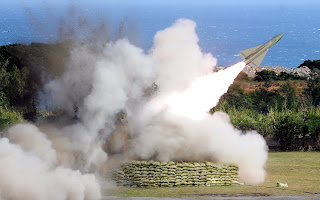 Language is often a reflection of hidden assumptions, and by dint of repetition we can lose sight of reality, especially on complex matters such as the Taiwan Strait
Language is often a reflection of hidden assumptions, and by dint of repetition we can lose sight of reality, especially on complex matters such as the Taiwan StraitPart of my job as deputy news chief at the
Taipei Times and columnist for a number of publications involves reading tremendous amounts of literature on Taiwan, not only so that I can keep pace with recent developments in the Taiwan Strait, but also to attempt, in all humbleness, to attain as thorough an understanding as possible of the story and history of Taiwan. This responsibility — and this is what it is, a responsibility — therefore, demands that I read newspapers, magazines, online articles, academic papers and history books, not only about Taiwan, but also China, Japan, the Asia Pacific, World War II, the US political system and so on.
What caught my attention recently is the recurrence of references to Taiwan not so much as an “island,” “Republic of China” or the despicable (and false) “province of China” — of which there are plenty, admittedly — but rather to Taiwan as an “issue,” “question” or “problem.” Such characterizations, which, I am sure, are in many instances the result of unconscious processes, turn a quantifiable plot of land (not to mention 23 million beating hearts) into mere abstracts, as if Taiwan were nothing more than a commodity to be divvied up, parsed out or handed over from one colonial master to another. We thus read about China “retaking the island,” the “Taiwan issue” affecting Sino-American relations, or Taiwan as an “unsinkable aircraft carrier,” with no reference to Taiwanese having a say over their own future. The problem is sanitized, the people taken out of the equation, just as they are in this era of electronic, long-distance warfare, where the living are killed with ever greater ease thanks to their being out of sight.
Does the world refer to Israel as “the Israel issue” when discussing the Middle East? Of course not: The US defends its ally, Israel, period. Even stateless Palestinians, who have more in common with Taiwanese than we are ready to acknowledge, are not reduced to an “issue” or “question”; instead, we talk about the Israeli-Palestinian conflict, the fate of Palestinians, et cetera. How, then, is it any more acceptable to obliterate Taiwanese and turn their nation into a commodity? Why can’t we refer to tensions in the Taiwan Strait as the Sino-Taiwanese conflict?
The great James R. Lilley, former CIA official, US ambassador to China and representative to Taiwan, who passed away last year, once told a young government official never to refer to Taiwan as an “issue.” Wise advice indeed, and something we should keep in mind when we add our own voices to coverage of Taiwan.
 After weeks of asking the Straits Exchange Foundation for updates on the submission of the ECFA to the WTO, the Bureau of Foreign Trade finally responded. An expert on preferential trade agreements comments
After weeks of asking the Straits Exchange Foundation for updates on the submission of the ECFA to the WTO, the Bureau of Foreign Trade finally responded. An expert on preferential trade agreements comments






















